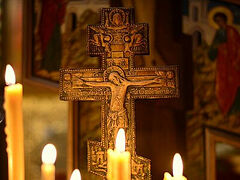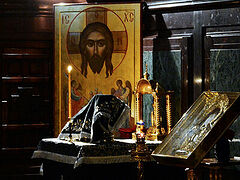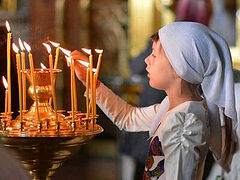The Fast has come, mother of chastity, accuser of sins,
advocate of repentance, life of the angels, and salvation of men.
(Monday of the First Week, Matins, Aposticha)
The voice of the publican, the voice of the prodigal, the voice of the thief, the images of repentance and contrition, the labor of temperance and purification—this is what the holy Church offers us now day after day, leading us down the path of the Holy Forty Days.
It offers us fasting and repentance, as blessed healing for the sick; it offers those who have squandered and lost their spiritual inheritance a saving way—to come to ourselves, gather our thoughts, stop the flow of vain desires, to look at our own lives with the eye of sound reasoning, draw near to God, to think about our soul, think about eternal salvation—these are the things that the holy Church now offers us!
Who doesn’t need to think about themselves? Who doesn’t need to delve into his own heart? Who doesn’t need to look at the inner state of his life and works? Living in the world, taking care of our everyday affairs, and then out of weakness, and more so out of predilection, burdened with bodily needs, with the demands of our external state, carried away by earthly goods, by temporal comforts—how often do we forget about our soul, about God, about eternal salvation?
Outwardly we’re like Christians, but more often than not, our inner state doesn’t correspond to our holy calling. Outwardly we live and seem to be trying to improve our lives and those of others, but by our spiritual state our thoughts are vain, our desires perverse, our disposition for goodness weak, our aspirations for evil unrestrained, our stumblings and falls incessant. In such a state, burdened from all sides with disorder, like heavy debts, troubled by conscience, like a strict lender, having neither true peace nor freedom, and even less so boldness before God, we like criminal slaves are afraid to look intently at and take care of ourselves.
Thus pass the greater part of our days, as waves in river rapids flow wherever the combined force of the waters rushes—to where the lust of the flesh, the lust of the eyes, and the pride of life draw us, reinforced by bad examples. We live in such a way that we don’t pay attention to our inner life; we act in such a way that we don’t judge what, how, and why we act. Or we judge, but our judgements are governed not by a sound mind, not by uprightness of heart, not by purity of conscience, not by the fear of God, but by carnal inclinations, habits, addictions, causing all our thoughts, desires, deeds, and undertakings to revolve sinfully around sensual, physical objects and things.
What is such a life? A forward flow, time continuing into the distance; but no increase, no prosperity, no ascent to perfection—but rather a diminution, impoverishment in spiritual strength and abilities. There’s a clouding of the mind by vanity, a hardening of the heart by worldly predilections, a loss of free will, which becomes over time weaker in doing good, more inclined to evil, more attached to the world, and colder to Christ.
Who doesn’t need to think about himself? Who doesn’t need to delve into his own heart? Who doesn’t need to look at the inner state of his life and deeds?
There’s nothing closer to us, nothing more necessary, nothing dearer than ourselves. If many approve of us, yet the few most thoughtful and virtuous don’t approve of us, it means we’re not good yet. And even if many consider us to be good, but according to the strict judgment of the conscience, in our own eyes, we’re not good, then we’re definitely not good. And if in the view of many we aren’t good, but before God, before our conscience, we’re not defamed, not condemned, then we aren’t completely not good. The inner, impartial judgment of our conscience before God should be a testimony for us, a verification, a measure of our worthiness. If we lose ourselves, if we lose the dignity of our personhood, if we ruin our souls, nothing can make up for this loss. For what is a man profited, if he shall gain the whole world, and lose his own soul? or what shall a man give in exchange for his soul? (Mt. 16:26).
Who among us doesn’t need to think about himself, to test himself, to consider his inner state—whether there are thoughts in our mind that darken the light of reason within us? Whether there are dispositions in our heart that, like a corrupting flame, devour the purity of our conscience? Whether there are any aspirations in our will that, like an infection, perceptibly corrupt our spiritual being? Examine yourselves, says the Apostle, whether ye be in the faith; prove your own selves (2 Cor. 13:5), whether we’re on the path of salvation, whether we’re flowing towards our intended goal, whether we’re living a true life.
What means do we have of testing ourselves? The surest, the most salvific means, which the holy Church offers us today, are fasting and repentance. They’re unpleasant for our carnal man, but salvific for the inner man. It’s treatment for the body, but true healing for the soul and revival for the spirit. True repentance is the gathering of thoughts from everyday distraction, the inner testing of oneself, of our life and works before God; and from there, reverent thinking about God, the tender contrition of the heart for our sins, the purification of the conscience from its burdensome iniquities, the firm correction of the will towards goodness. In short: Repentance is bringing ourselves into a state of good and right thinking, a pious disposition of the heart, a resolute direction of the will towards fulfilling whatsoever things are true, whatsoever things are honest, whatsoever things are just, whatsoever things are pure, whatsoever things are lovely, whatsoever things are of good report (Phil. 4:8).
Who doesn’t desire peace with God, purity of conscience, quietness of spirit, uprightness of heart? Who doesn’t desire to bring himself into a state of rightness in internal dispositions, good order in external behavior, decorum in all his words and deeds? Fasting leads to this paradisiacal state of discipline. And fasting is the mentor of repentance; it prepares, strengthens, and cleanses repentance itself, and therefore it is a necessary guide on the path to spiritual perfection.
And if we wanted to personify fasting in order to see its inner goodness more clearly, with a lively desire to partake of its grace-filled gifts, we could see it in the splendor of angelic kindness; we could see it in the fruitfulness of salvific deeds; we could see that fasting is adorned in purity, like a fine linen; it is girded with temperance, like a golden belt; it is shod with readiness for every good obedience; sobriety and peace are its continuous inner work, labor and charity are its external work; in its mouth is sweet food; it is prayer and contemplation; its facial features are meekness, angelic vision, full of reverence for God, and holy edification for others.
Let us look with an impartial, unclouded gaze at the disorder of our sinful life, and fasting will appear to us as a saving medicine for our spiritual infirmities and illness. Let us vividly sense the imperfection that fills us both inside and out, humiliating us not only before others, but also in our own eyes, and the Fast will be for us a desired guide to bring ourselves into good rationality of the mind, into the proper disposition of the heart, into the proper ordering of all our senses, that we might walk worthy of God in a sense of reverence, and worthy of others by an example of an edifying life, worthy of the holy title of Christian by preserving ourselves in purity and integrity.
Thus, let us vigilantly, unabatedly maintain the Fast as a saving means for the enlightenment of our minds, for the purification of our hearts, for the proper ordering of all our senses, and we will be accounted worthy by the grace of Christ to accomplish it with spiritual fruit. And having communed of the sufferings of Christ as far as we are able, we will be accounted worthy to achieve the joy of the life-giving Resurrection of Christ.
Amen.




